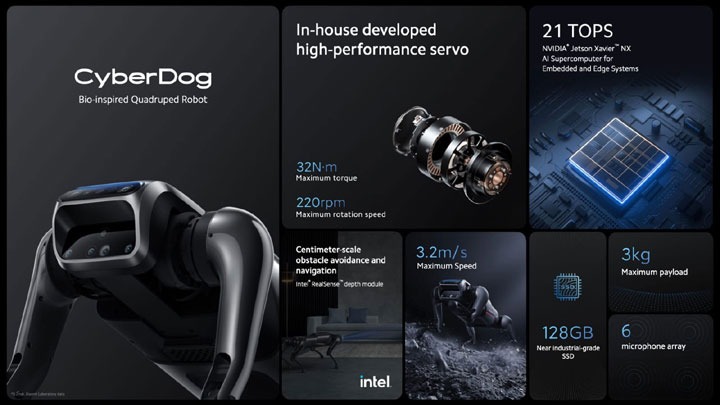Xiaomi Forays into Quadruped Robotics, Unveils CyberDog
The CyberDog comes embedded with an array of camera sensors including AI interactive cameras, binocular ultra wide-angle fisheye cameras and Intel RealSense D450 Depth module and can be trained with its computer vision algorithm.
Beijing: Xiaomi has unveiled a new quadruped robot called CyberDog — an experimental, open-source machine that the company said “holds unforetold possibilities”.
The launch of CyberDogs is the culmination of Xiaomi’s engineering prowess, condensed into an open-source robot companion that developers can build upon, the company said in a statement on Tuesday.
The CyberDog comes embedded with an array of camera sensors including AI interactive cameras, binocular ultra wide-angle fisheye cameras and Intel RealSense D450 Depth module and can be trained with its computer vision algorithm.
Built upon this vision sensor system are autonomous object tracking, SLAM and centimeter-scale obstacle avoidance and navigation. This means that CyberDog can analyse its surroundings in real-time, create navigational maps, plot its destination and avoid obstacles.
Coupled with human posture and face recognition tracking, CyberDog is capable of following its owner and darting around obstructions.

According to the company, CyberDog is Xiaomi’s first foray into quadruped robotics for the open-source community and developers worldwide.
Robotics enthusiasts interested in CyberDog can compete or co-create with other like-minded Xiaomi Fans, together with propelling the development and potential of quadruped robots, the company said.
CyberDog is calibrated with Xiaomi’s in-house developed servo motors that translate into great speed, agility and a wide range of motion.
With a maximum torque output and rotation speed up to 32N·m/220Rpm, CyberDog can conduct a range of high-speed movements up to 3.2m/s and complicated actions such as backflips.
To fully model biological organisms, CyberDog is equipped with 11 high-precision sensors which provide instant feedback to guide its movements. This includes touch sensors, cameras, ultrasonic sensors, GPS modules, and more, giving the CyberDog enhanced capability to sense, analyse and interact with its environment.
To add to its pet-like nature, users can use voice assistants to command and control CyberDog by setting a wake word, or simply use its accompanying remote and smartphone app.
CyberDog can be called on for the most unique tasks, and how it can interact with holds unforetold possibilities, the company said.
